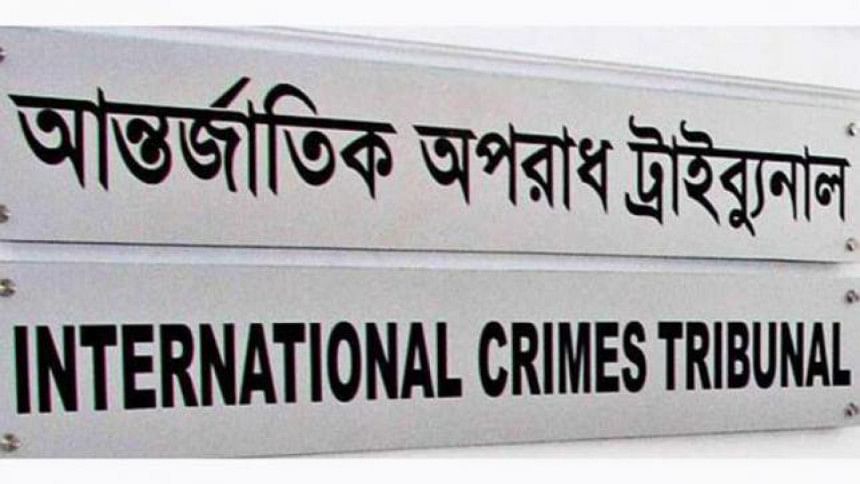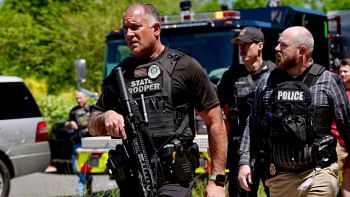2 Kishoreganj men sentenced to death

A war crimes tribunal yesterday sentenced two people from Kishoreganj to death for crimes they had committed during the 1971 Liberation War.
“The gravest nature of the offences of 'extermination' 'genocide 'and 'murder' and the accused persons' participation and complicity therewith as already found proved shakes human conscience, the humanity and civilization,” said the International Crimes Tribunal-1 in the verdict.
The court said all the six charges brought against the accused -- Syed Mohammad Hussain alias Hossain, 64, younger brother of convicted war criminal Syed Hasan Ali, and Muhammad Moslem Pradhan, 66 -- had been proved.
“These proved indictments also demonstrate the accused persons' close and culpable affiliation with the Pakistani occupation army as collaborators.”
Of the convicts, Hussain, the commander of Razakar Bahini in Nikli, is believed to have left for Malaysia in May 2014, while Moslem, a member of the Pakistani army's auxiliary force, is now in jail.
On execution of Moslem's death sentence, the tribunal said he could be executed “by hanging or shooting.”
As with the fugitive, it directed the home secretary (public security division) and the inspector general of police to ensure his arrest, if needed, with the help of Interpol.
Tureen Afroz, prosecutor in the case filed against the two, expressed satisfaction with the verdict while defence counsel Abdus Sattar Palwan said he, upon consultation with his client, Moslem, would challenge the judgement in the Supreme Court.
According to the International Crimes (Tribunals) Act, 1973, a war crimes convict can file an appeal with the SC within 30 days from the date of the verdict's pronouncement.
With the latest verdict, the war crimes tribunal have so far delivered 28 judgements against 53 people. Thirty-one of them have been sentenced to death.
CONVICTS' IDENTITIES, CHARGES AND PUNISHMENTS
Hussain had originally been from Machihata village (Pir Bari) in Brahmanbaria sadar upazila but began living with his family in Kishoreganj sadar upazila since 1936 as his father worked there, according to the investigators.
His father, Syed Musleh Uddin, was vice-president of the then East Pakistan unit of Pakistan Democratic Party (PDP) and chairman of the Peace Committee in Kishoreganj sub-division in 1971. Both PDP and Peace Committee worked against Bangladesh's independence.
Hussain was the commander of the Razakar force in Nikli upazila and was known as “Razakarer Daroga”, while his brother Syed Hassan led Razakars in Tarail upazila. Moslem, of Kamarhati village in Nikli, was Hussain's associate, according to the prosecution.
The prosecution pressed six charges against the duo -- Hussain faced all the charges while Moslem faced two.
The three-member tribunal led by Justice Anwarul Haque with members Justice Md Shahinur Islam and Justice Md Shohrowardi read out the summery of 563-page judgment.
Although, Justice Shohrowardi wrote a separate judgment, he was of the same view regarding punishment.
Hussain and Moslem were given the capital punishment for killing 26 people in Gurui village of Nikli upazila and for plundering and arson attacks.
The duo face jail until death for abduction and murder of freedom fighter Abdul Malek, of Purbogram village.
The special court also awarded Hussain death penalty for participating in the killing of 34 Hindu men and raping of Hindu women at Dampara in Nikli; seven-year rigorous imprisonment for forceful conversion of Hindus of Dampara to Islam; five-year jail for abduction and confinement of four people of Nikli; and 10-year jail for mistreating the dead bodies of two freedom fighters.
The sentences of imprisonment will run concurrently and other sentences will be merged with the execution of death penalty, the tribunal said.
RAPE IN 1971: AN OFFENCE OF GENOCIDE
Among the six charges, one is linked with the abduction of 39 Hindus, of whom 34 were killed, and the rape of several women from the minority community.
While adjudicating on the charge, the tribunal said, “It stands proved that rape upon Hindu women was committed in conjunction with the criminal act of detaining the 39 Hindu male civilians of village Dampara that eventually resulted in killing of 34 Hindus”
“And thus, it was rather genocidal rape as it was chosen as one of the worst ways of inflicting 'serious bodily injury and mental harm' upon the women presumably due to their membership in Hindu religious group intending to cause destruction of religious belief, the will to live, and of life itself of the victims belonging to a protected group.
“Rape or sexual violence committed upon the Hindu women including PW [prosecution witness] 3 and PW 4 may thus be validly viewed as a crime perpetrated against a 'group' and not against an individual woman, and therefore, the rape committed upon Hindu women was 'genocidal rape' indeed,” it added.
Justice Shohrowardi, however, did not agree with this observation made by two other judges. Although, he considered the killing of Hindus an act of genocide, he found the rape of Hindu women as crimes against humanity.

 For all latest news, follow The Daily Star's Google News channel.
For all latest news, follow The Daily Star's Google News channel. 



Comments